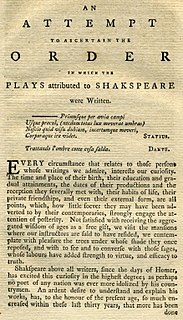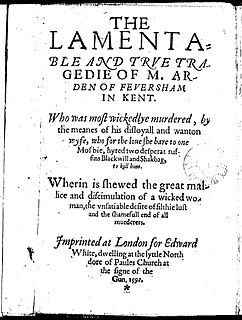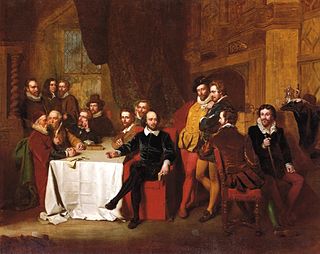Simon Palfrey is an English Scholar at Oxford University and a Fellow in English at Brasenose College, Oxford University. [1] He specialises in Shakespeare and Renaissance literature. [2]

Renaissance literature refers to European literature which was influenced by the intellectual and cultural tendencies associated with the Renaissance. The literature of the Renaissance was written within the general movement of the Renaissance which arose in 14th-century Italy and continued until the 16th century while being diffused into the rest of the western world. It is characterized by the adoption of a humanist philosophy and the recovery of the classical Antiquity. It benefited from the spread of printing in the latter part of the 15th century. For the writers of the Renaissance, Greco-Roman inspiration was shown both in the themes of their writing and in the literary forms they used. The world was considered from an anthropocentric perspective. Platonic ideas were revived and put to the service of Christianity. The search for pleasures of the senses and a critical and rational spirit completed the ideological panorama of the period. New literary genres such as the essay (Montaigne) and new metrical forms such as the Spenserian stanza made their appearance.
Palfrey was born in Hobart, Tasmania, Australia, grew up in Australia and was a Rhodes Scholar at Oxford University. He is known for his approach to Shakespeare's work, in which he discusses the dynamism of the playwright's language, its psychological effects and the actorly and bodily decisions generated by word-use.

Hobart is the capital and most populous city of the Australian island state of Tasmania. With a population of approximately 225,000, it is the least populated Australian state capital city, and second smallest if territories are taken into account. Founded in 1804 as a British penal colony, Hobart, formerly known as Hobart Town or Hobarton, is Australia's second oldest capital city after Sydney, New South Wales. Prior to British settlement, the Hobart area had been occupied for possibly as long as 35,000 years, by the semi-nomadic Mouheneener tribe, a sub-group of the Nuennone, or South-East tribe. The descendants of these Aboriginal Tasmanians often refer to themselves as 'Palawa'.

Tasmania is an island state of Australia. It is located 240 km (150 mi) to the south of the Australian mainland, separated by Bass Strait. The state encompasses the main island of Tasmania, the 26th-largest island in the world, and the surrounding 334 islands. The state has a population of around 526,700 as of March 2018. Just over forty percent of the population resides in the Greater Hobart precinct, which forms the metropolitan area of the state capital and largest city, Hobart.

Australia, officially the Commonwealth of Australia, is a sovereign country comprising the mainland of the Australian continent, the island of Tasmania and numerous smaller islands. It is the largest country in Oceania and the world's sixth-largest country by total area. The neighbouring countries are Papua New Guinea, Indonesia and East Timor to the north; the Solomon Islands and Vanuatu to the north-east; and New Zealand to the south-east. The population of 25 million is highly urbanised and heavily concentrated on the eastern seaboard. Australia's capital is Canberra, and its largest city is Sydney. The country's other major metropolitan areas are Melbourne, Brisbane, Perth and Adelaide.
His book Doing Shakespeare has been called "an original and long-overdue resource for theatre scholar-artists." [3] It was listed as an "International Book of the Year" in 2004 by the Times Literary Supplement . In the TLS, Jonathan Bate said that although the work was "sometimes wayward," the book was 'always provocative of serious thought'. Bate could think 'of no critic since Empson who has teased out so much so lucidly and (usually) so persuasively from the intricacies of Shakespearean language." [4] Palfrey's earlier book, Late Shakespeare: A New World of Worlds was described by Ann Jennalie Cook as 'among the most significant books of the year', 'a sweeping vision of these plays' language...indispensable for its subject', and as "a valuable contribution to the political reading of Renaissance literary forms" which challenged the traditional reading of Shakespeare's four romances. [5] Russ McDonald writing in Shakespeare Quarterly described Late Shakespeare as "original, quirky, occasionally brilliant, and almost always demanding." [6]
Sir Andrew Jonathan Bate, CBE, FBA, FRSL, is a British academic, biographer, critic, broadcaster, novelist and scholar. He specialises in Shakespeare, Romanticism and Ecocriticism. He is Professor of English Literature at the University of Oxford, Provost of Worcester College, Oxford, Gresham Professor of Rhetoric, and Honorary Fellow of Creativity at Warwick Business School. He was knighted in 2015 for services to literary scholarship and higher education.
Palfrey's 2007 collaboration with theatre historian Tiffany Stern, Shakespeare in Parts, was awarded the 2009 Medieval and Renaissance Drama Society's David Bevington Prize for best new book. Palfrey's latest work is a collaborative novel written with fellow Shakespeare scholar Ewan Fernie.
Collaborative fiction is a form of writing by a group of three or more authors who share creative control of a story.

Ewan Fernie is a British scholar and writer. He is Professor, Fellow and Chair of Shakespeare Studies at the Shakespeare Institute, University of Birmingham. He is also Director of the pioneering 'Everything to Everybody' Project, a collaboration between the University of Birmingham and Birmingham City Council.










